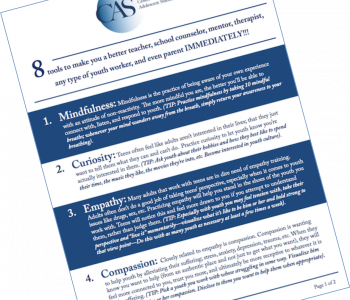

Catharine Hannay, MA
Catharine Hannay is the founder of MindfulTeachers.org and the author of Being You: A Girl’s Guide to Mindfulness, a workbook for teen girls on mindfulness, compassion, and self-acceptance.
5 Ways to Practice Self-Care When You’re Exhausted and Overwhelmed
“Dr. Tudbelly eyed the distraught Lionel. ‘What are your symptoms? Do you feel baffled? Bewildered? Confused? A little edgy? Frightened? Puzzled?’
‘Yes, yes!’ cried Lionel. ‘All of that!’
‘Good,’ said Dr. Tudbelly. ‘You’re quite normal.’
‘But what shall I do?’
‘Why, the same as any sensible person in the circumstances. Keep going. Hope for the best.’
[…] This advice gave Lionel no comfort, but he could do no more than follow it. Choking back his distress, he plucked up as much heart as he could and started off again.”
(Lloyd Alexander, The Cat Who Wished to Be a Man, p. 67)
I think most of us can relate to poor overwhelmed Lionel these days, in the midst of the volatile political situation, the ongoing challenges of COVID-19, and a seemingly endless string of natural disasters all over the world. And for anyone in healthcare, education, and other helping/serving roles, there’s the added burden of working under impossible conditions.
Far too many teachers started the school year with conversations like this:
Teacher: “Should we keep our classroom doors open to ventilate and help stop the spread of COVID-19?”
Principal: “No. You should keep your classroom doors closed to protect against active shooters.”
Nobody should have to work under those conditions! Nor should anyone have to work under the conditions at many nonprofits and medical settings.
I doubt you need me to say, “You should take care of yourself.” You probably already know that. It’s much more likely you’re so worn out it’s hard to find the time to even think about self-care.
Here are a few suggestions of ways you can take care of yourself when you’re exhausted and overwhelmed from caring for others.
Suggestion # 1: Focus on What You Can Control
“I worried a lot. Will the garden grow, will the rivers flow in the right direction, will the earth turn as it was taught, and if not, how shall I correct it?”
(from the poem ‘I Worried’ by Mary Oliver)
Too many helpers feel helpless because we’re focused on all the things we don’t really have any control over. As Laura van Dernoot Lipsky puts it, “You know in your gut that there is only so much you can do, but you still feel responsible in some way.” (Trauma Stewardship, p. 51)
As much as possible, shift your focus to what you can control in any given situation. For example:
- You can’t save everyone. You can focus on helping the individuals in your care to the best of your ability given the reality of your working conditions.
- You can’t control other people’s unrealistic expectations. You can control whether you speak to them calmly in order to avoid escalating the situation. And you can stop replying to non-urgent messages at a certain hour every evening.
Suggestion #2: Adopt a Resilience Slogan or Theme Song
I’m not a big fan of affirmations like “Everything happens for a reason” (Really?!) or “I can handle whatever comes my way.” (Sure doesn’t feel like it!)
On the other hand, I do like anti-perfectionist slogans like “I’m doing the best I can” and “When all else fails, lower your standards.” I’m not suggesting that anybody shirk their responsibilities. I just think it’s better to recognize your own limits than to let yourself get pulled so hard in different directions that you snap or fall apart.
Here are the messages I find most helpful when I’m feeling totally overwhelmed:
- “One foot in front of the other.”
- “That issue isn’t a priority today.”
- “I don’t have to want to do this. I just have to do it.”
- “There is no good option. This is the least bad option available.”
- “That decision’s been made. I need to move on to the next decision.”
And here are the songs that are resonating with me the most these days (with links to youtube, so you might want to adjust your volume):
- Trying My Best, by Anson Seabra
- Hope Lingers On by Low Lily
- Keep On Keepin On by Daphne Willis
Suggestion #3: Let Yourself Not Be Okay for a While
Sometimes it can feel like it’s all too much and you just can’t go on—yet here you are facing another day.
The only cure for wanting to weep in exhaustion or yell in frustration may be to actually weep in exhaustion or yell in frustration. You just have to be very careful where and when you do this because most people can’t handle bearing witness to others’ pain.
Katherine May is annoyed by social media posts “offering unsolicited advice on how to cope with a crisis”:
“Hang on in there! they say, apropos of nothing. You are stronger than you know. […]
And what if I can’t hang on in there? What then? […] We need friends who wince along with our pain, who tolerate our gloom, and who allow us to be weak for a while when we’re finding our feet again.
We need people who acknowledge that we can’t always hang on.”
(Wintering: The Power of Rest and Retreat in Difficult Times, p. 235-237)
When I was going through a really tough time, I sent a text to my sister briefly describing the situation, and ended with “Bwaaaaaack!”
I felt a lot better when I got her reply. “Yikes. Bwaaaaaack indeed!”
We’re not always looking for advice. And there are some situations where there really isn’t much we can do. Sometimes it makes all the difference when someone just listens to us and acknowledges our frustrations and suffering.
It can also help to write it all out then crumple up the paper and chuck it in the recycling bin. Julia Cameron has a famous technique called ‘morning pages,’ which involves three pages of stream-of-consciousness writing first thing in the morning. I do this at different times of day, and I sometimes think of it as ‘mourning pages’ because it helps me to grieve.
Suggestion #4: Don’t Throw Good Time After Bad
Having just said that it can be helpful to vent, I’d like to offer a caveat: There’s a difference between blowing off steam and fanning the flames.
Françoise Mathieu describes how she and a couple of coworkers realized they were making things even harder on themselves:
“We used to go straight into a nearby office and have a debrief about the meeting. But in truth, this was mostly a bitch session about our colleagues, management, and the university as a whole. […]
So we deliberately decided to stop gossiping about work for 3 months, and the result was striking. We were not necessarily successful at changing our dysfunctional workplace, but we were no longer part of the toxicity, and that significantly improved my work experience.”
(The Compassion Fatigue Workbook, p. 72)
I was caught in a similar situation a few years ago, during a series of frustrating after-work meetings. I kept joining the post-meeting gripe sessions, then spent most of the evening thinking about work.
It felt like a particular issue was taking all my time and energy, but I eventually realized something. I was productively dealing with it for maybe half an hour a day and the rest of the time I was just caught in a loop of stress and resentment and rumination.
I felt a lot better when I started leaving immediately after the meetings and doing a Rainbow Walk* on my way home to clear my head.
*Rainbow Walk is a mindfulness practice I developed that’s popular with adults and kids of all ages. Go for a stroll and look for something in each color of the rainbow: red, orange, yellow, green, blue, and purple. Then start back with red and go through the colors again and again until the end of your walk. This is a great way to practice mindful awareness of your surroundings, and it helps focus your attention away from whatever’s worrying you and onto something positive or neutral.
Suggestion #5: Ignore One-Size-Fits-All Solutions
“Meditation, so I’ve heard, is best accomplished if you entertain a certain strict posture. Frankly, I prefer to just lounge under a tree.”
Mary Oliver, from ‘On Meditating, Sort Of’
I’ve seen a few workplaces where a well-intentioned person insists that everyone has to read the same mindfulness book or use the same eating plan. Instead of being helpful, this usually causes a lot of resentment, especially if the book or the eating plan is incompatible with certain religious beliefs.
The truth is, nothing is going to benefit absolutely everyone. Checking your social media feed may be relaxing for you, or it might make you feel even more distressed. You might benefit from vigorous exercise, or you might benefit from easing up a bit. (It’s not like the yoga police are gonna arrest you if you skip a challenging pose or swap it out for something more manageable.)
I conducted an informal survey of the ways busy helpers (educators, nurses, counselors, etc.) have found to balance their own needs with the needs of the people they serve. As you’ll see, there’s quite a lot of variety:
- “I take walks with my dog. She’s the best therapist in the world.’
- “Sometimes I arrive early for an appointment and take a nap in my car.”
- “I used to hate sitting on the train for an hour back and forth to work. Now I enjoy catching up on all the books I want to read.”
- “I started arriving half an hour earlier than anyone else so I can do yoga in my office before we open for the day.”
- “When I’m in my car, that’s my time. I listen to Christian rock on the radio, and that helps me focus on my values.”
- “I feel more in control of my life when I spend fifteen minutes a day tidying my apartment.”
- “A daily mindfulness practice, connecting with friends, spending time out in nature, taking walks, yoga, listening to podcasts (specifically Glennon Doyle and Brené Browns work), reading, webinars that support the work I am doing, therapy.”
As for me, whenever I get the chance, I take a walk around my neighborhood or in a local park. Unfortunately, I haven’t been able to do much walking for the past few months because I’ve been recovering from an injury. That’s been frustrating, but I’ve found a good replacement: sketching flowers.
I’m still looking forward to getting back to walking as soon as my feet are up for it. In the meantime, I have an alternate way to take a break from my laptop, clear my head, and focus on the natural world.
Conclusion
I hope these suggestions help you figure out ways to feel a bit better when you’re exhausted and overwhelmed. You might want to ask yourself:
- Is there a slogan or song that calms me down or peps me up?
- What small change to my routine would make my life a bit easier?
- How can I get a break between challenges or at the end of the day?
- Who in my life would be a good person to confide in when I’m struggling?
- Is there a way to make my commute more enjoyable, or at least more manageable?
- What could I do in just a few minutes a day that would help me feel a little calmer?
For more self-care tips for the helping professions, see:

